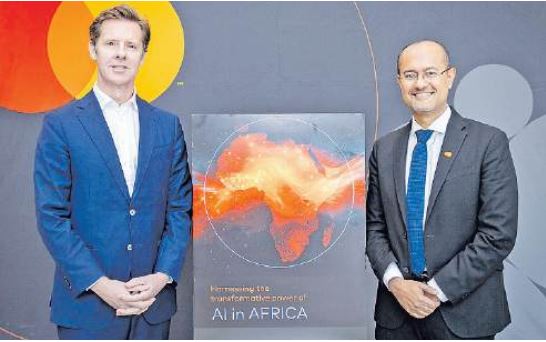
 Mastercard Africa division president Mark Elliott with country manager for East
Africa Shehryar Ali during the launch of the report /HANDOUT
Mastercard Africa division president Mark Elliott with country manager for East
Africa Shehryar Ali during the launch of the report /HANDOUT
Kenya’s growing mobile money and e-commerce sectors are emerging as key battlegrounds in the fight against financial fraud and artificial intelligence (AI) is fast becoming the weapon of choice.
This is according to Mastercard’s AI in Africa 2025 white paper, which points out that mobile money transactions in Kenya, led by platforms such as M-Pesa, have reached unprecedented scale, processing billions of shillings daily and drawing millions of new users into the formal financial system.
But this success has attracted increasingly sophisticated cybercriminals, from identity thieves to syndicates orchestrating account takeovers and payment scams.
According to the report, fraudulent activity has increased across the continent, while Kenyan banks and payment providers have reported parallel increases in phishing, SIM-swap fraud, and fake merchant schemes.
With digital payments expanding into rural markets and low-income segments, the paper warns that threat profile is widening.
“Fraud, including identity theft, account takeovers, false transactions, and check scams, remains a significant challenge globally. Financial losses from credit card fraud alone are projected to hit $43 billion by 2026,” said Mastercard’s Vice President for Privacy and Data Protection for AI Jasmien César.
She added that AI-powered systems are proving invaluable in combating these. As mobile money platforms like M-Pesa continue to grow across Africa, the integration of AI-driven fraud detection systems becomes essential.
Already, the Communications Authority of Kenya (CA) has raised alarm over what it terms the increasing proliferation of Artificial Intelligence (AI)-enabled cyberattacks, even as the overall threats targeting Kenyan organisations and institutions dipped 41.9 per cent.
Mastercard says it is responding with AI-driven fraud detection systems trained on vast, locally relevant transaction datasets, including those from Nairobi, Lagos, and Johannesburg.
These systems scan and process transactions in milliseconds, spotting anomalies — such as unusual spending patterns, location mismatches, or irregular device behaviour — and flagging them before payments are completed.
“Algorithms are useful in identifying unusual spending patterns, thus making AI a tool for better fraud detection and risk management,” the report notes.
For mobile money users, AI integration offers a crucial safeguard. Many Kenyan households now rely on mobile wallets not only for daily purchases but also for receiving salaries, paying school fees, and accessing microloans.
“A compromised account can devastate a family’s finances. AI’s speed and predictive capabilities reduce this risk by catching fraudulent activity early — in many cases before the user even notices irregularities,” the paper notes.
E-commerce merchants in Kenya are equally vulnerable. With more small businesses joining online marketplaces and adopting digital checkout systems, cybercriminals have new entry points.
Mastercard says AI can help protect these SMEs by detecting chargeback fraud, verifying customer identities, and screening new seller accounts for potential risk factors.
Mastercard Africa division president Mark Elliott said Africa’s engagement with AI is already reshaping lives — not just in labs, but in farms, clinics and classrooms.
“To unlock its full potential, we need investment in infrastructure, data, talent, and policy. At Mastercard, we believe responsible, locally rooted AI can drive inclusive growth and connect more people to opportunity,” said Elliott.
Mastercard points out that African fraud-detection AI must be trained on local transaction patterns to be effective.
“Models built on European or North American spending behaviour can produce false positives in African markets, where seasonal income fluctuations, shared device usage, and informal lending are common,” the paper notes.
This localisation requires close collaboration between global technology providers, local banks, fintechs, and regulators. Kenya’s fintech ecosystem — anchored by M-Pesa, Pesapal, Tala, and Jumo — provides both the transaction volume and the innovation capacity needed to refine these systems.
Ali Hussein Kassim, Chairman of the Association of Fintechs in Kenya, told Mastercard researchers that while financial inclusion has climbed to nearly 90per cent, “a lot of education is required” for consumers and small enterprises to fully understand AI’s benefits and safeguards.
Governments, he said, are engaging the private sector to develop AI principles that balance innovation with risk management.











